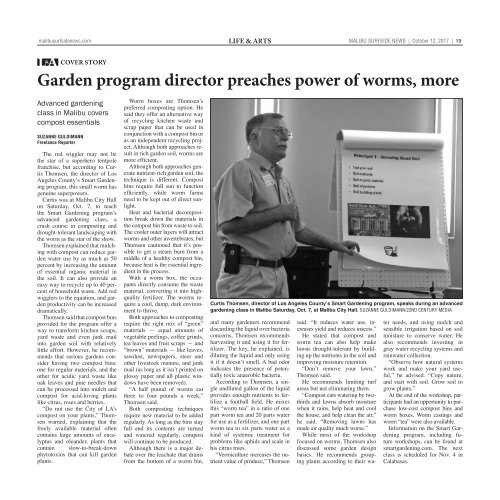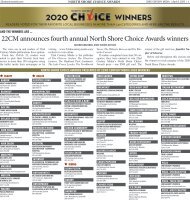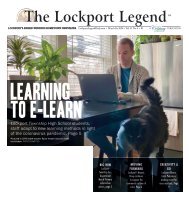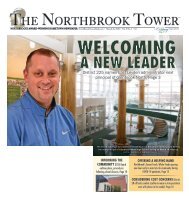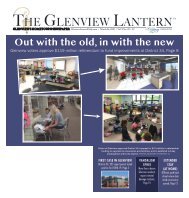MSN_101217
Malibu Surfside News 101217
Malibu Surfside News 101217
Create successful ePaper yourself
Turn your PDF publications into a flip-book with our unique Google optimized e-Paper software.
malibusurfsidenews.com Life & Arts<br />
Malibu surfside news | October 12, 2017 | 19<br />
Garden program director preaches power of worms, more<br />
Advanced gardening<br />
class in Malibu covers<br />
compost essentials<br />
Suzanne Guldimann<br />
Freelance Reporter<br />
The red wiggler may not be<br />
the star of a superhero tentpole<br />
franchise, but according to Curtis<br />
Thomsen, the director of Los<br />
Angeles County’s Smart Gardening<br />
program, this small worm has<br />
genuine superpowers.<br />
Curtis was at Malibu City Hall<br />
on Saturday, Oct. 7, to teach<br />
the Smart Gardening program’s<br />
advanced gardening class, a<br />
crash course in composting and<br />
drought-tolerant landscaping with<br />
the worm as the star of the show.<br />
Thomsen explained that mulching<br />
with compost can reduce garden<br />
water use by as much as 50<br />
percent by increasing the amount<br />
of essential organic material in<br />
the soil. It can also provide an<br />
easy way to recycle up to 40 percent<br />
of household waste. Add red<br />
wigglers to the equation, and garden<br />
productivity can be increased<br />
dramatically.<br />
Thomsen said that compost bins<br />
provided for the program offer a<br />
way to transform kitchen scraps,<br />
yard waste and even junk mail<br />
into garden soil with relatively<br />
little effort. However, he recommends<br />
that serious gardens consider<br />
having two compost bins:<br />
one for regular materials, and the<br />
other for acidic yard waste like<br />
oak leaves and pine needles that<br />
can be processed into mulch and<br />
compost for acid-loving plants<br />
like citrus, roses and berries.<br />
“Do not use the City of LA’s<br />
compost on your plants,” Thomsen<br />
warned, explaining that the<br />
freely available material often<br />
contains large amounts of eucalyptus<br />
and oleander, plants that<br />
contain slow-to-break-down<br />
phytotoxins that can kill garden<br />
plants.<br />
Worm boxes are Thomsen’s<br />
preferred composting option. He<br />
said they offer an alternative way<br />
of recycling kitchen waste and<br />
scrap paper that can be used in<br />
conjunction with a compost bin or<br />
as an independent recycling project.<br />
Although both approaches result<br />
in rich garden soil, worms are<br />
more efficient.<br />
Although both approaches generate<br />
nutrient-rich garden soil, the<br />
technique is different. Compost<br />
bins require full sun to function<br />
efficiently, while worm farms<br />
need to be kept out of direct sunlight.<br />
Heat and bacterial decomposition<br />
break down the materials in<br />
the compost bin from waste to soil.<br />
The cooler outer layers will attract<br />
worms and other invertebrates, but<br />
Thomsen cautioned that it’s possible<br />
to get a steam burn from a<br />
middle of a healthy compost bin,<br />
because heat is the essential ingredient<br />
in the process.<br />
With a worm box, the occupants<br />
directly consume the waste<br />
material, converting it into highquality<br />
fertilizer. The worms require<br />
a cool, damp, dark environment<br />
to thrive.<br />
Both approaches to composting<br />
require the right mix of “green”<br />
materials — equal amounts of<br />
vegetable peelings, coffee grinds,<br />
tea leaves and fruit scraps — and<br />
“brown” materials — like leaves,<br />
sawdust, newspapers, steer and<br />
other livestock manure, and junk<br />
mail (as long as it isn’t printed on<br />
glossy paper and all plastic windows<br />
have been removed).<br />
“A half pound of worms eat<br />
three to four pounds a week,”<br />
Thomsen said.<br />
Both composting techniques<br />
require new material to be added<br />
regularly. As long as the bins stay<br />
full and its contents are turned<br />
and watered regularly, compost<br />
will continue to be produced.<br />
Although there is a major debate<br />
over the leachate that drains<br />
from the bottom of a worm bin,<br />
Curtis Thomsen, director of Los Angeles County’s Smart Gardening program, speaks during an advanced<br />
gardening class in Malibu Saturday, Oct. 7, at Malibu City Hall. Suzanne Guldimann/22nd Century Media<br />
and many gardeners recommend<br />
discarding the liquid over bacteria<br />
concerns, Thomsen recommends<br />
harvesting it and using it for fertilizer.<br />
The key, he explained, is<br />
diluting the liquid and only using<br />
it if it doesn’t smell. A bad odor<br />
indicates the presence of potentially<br />
toxic anaerobic bacteria.<br />
According to Thomsen, a single<br />
undiluted gallon of the liquid<br />
provides enough nutrients to fertilize<br />
a football field. He mixes<br />
this “worm tea” in a ratio of one<br />
part worm tea and 20 parts water<br />
for use as a fertilizer, and one part<br />
worm tea to six parts water as a<br />
kind of systemic treatment for<br />
problems like aphids and scale in<br />
his citrus trees.<br />
“Vermiculture increases the nutrient<br />
value of produce,” Thomsen<br />
said. “It reduces water use, increases<br />
yield and reduces insects.”<br />
He stated that compost and<br />
worm tea can also help make<br />
lawns drought-tolerant by building<br />
up the nutrients in the soil and<br />
improving moisture retention.<br />
“Don’t remove your lawn,”<br />
Thomsen said.<br />
He recommends limiting turf<br />
areas but not eliminating them.<br />
“Compost cuts watering by twothirds<br />
and lawns absorb moisture<br />
when it rains, help heat and cool<br />
the house, and help clean the air,”<br />
he said. “Removing lawns has<br />
made air quality much worse.”<br />
While most of the workshop<br />
focused on worms, Thomsen also<br />
discussed some garden design<br />
basics. He recommends grouping<br />
plants according to their water<br />
needs, and using mulch and<br />
sensible irrigation based on soil<br />
moisture to conserve water. He<br />
also recommends investing in<br />
gray water recycling systems and<br />
rainwater collection.<br />
“Observe how natural systems<br />
work and make your yard useful,”<br />
he advised. “Copy nature,<br />
and start with soil. Grow soil to<br />
grow plants.”<br />
At the end of the workshop, participants<br />
had an opportunity to purchase<br />
low-cost compost bins and<br />
worm boxes. Worm castings and<br />
worm “tea” were also available.<br />
Information on the Smart Gardening<br />
program, including future<br />
workshops, can be found at<br />
smartgardening.com. The next<br />
class is scheduled for Nov. 4 in<br />
Calabasas.


